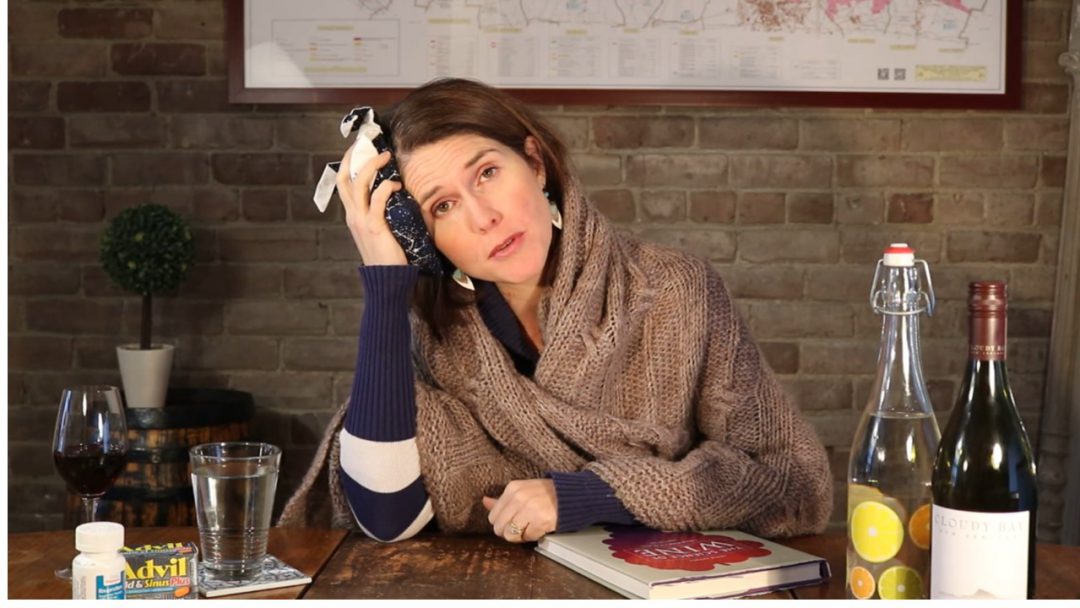One of the main questions I get asked when I mention my profession is: why do I get headaches from drinking white or red wine? Before I have a chance to answer, the asker generally presents me with a few explanations they have read or heard about. These theories are often misguided. So I decided to review current literature and let you know why wine is giving you headaches.
***Side note: I have also made this blog post into a three minute YouTube video. To watch, just scroll down to the bottom & click play. If you enjoy the video, consider subscribing to my YouTube channel so you never miss an episode of my weekly wine education series.
Sulphites
Let’s start with sulphites. Sulphites are a group of sulphur-based chemicals, which include sulphur dioxide. They are a naturally occurring by-product of wine fermentation. Sulphur is also added to many wines over the course of the winemaking process as it is a highly effective preservative against spoilage and oxidation. For these same reasons, sulphur is an ingredient in many processed foods like fruit juice, jams, flavoured yoghurts, pickled foods, mustard and dried fruits.
The European Union legal limit for total sulphur dioxide at bottling ranges between 100mg/L for organic dry red wines and 200mg/L for non-organic dry white wines – with all other organic and non organic dry wines falling between these limits. These are the maximum amounts, and most conscience winemakers are using far less nowadays. The majority of health professionals agree that, at these levels, the sulphites in wine do not cause headaches. Dried apricots can contain up to five times the sulphite levels of wine, and yet you rarely hear anyone insisting that dried fruit gives them migraines. It has been found that in roughly 1% of the population, generally people already suffering from issues like asthma, sulphites can cause breathing problems, but not headaches.
The tannin in red wine acts as an anti-oxidant, meaning that red wines generally contain less sulphur than white wines. If your wine headaches come primarily from red wine consumption, then there is even less likelihood that sulphites are to blame.
So why is wine giving you headaches? Several culprits have been identified by researchers:
Alcohol
People never seem to want to hear this but alcohol is often the problem. Many types of headaches are caused by simple dehydration. Alcohol is a diuretic, meaning that it makes you pee more frequently. This causes the body to lose more fluid and become dehydrated. Happily, there are lots of simple ways to avoid alcohol-related dehydration:
- Drink moderately (health officials advise limiting consumption to 1 – 2 glasses of 120 – 150mL per day, depending on sex, weight, and tolerance)
- Try switching to lower alcohol wines
- Avoid sweeter wine styles (the combination of sugar and alcohol in wine is said to dehydrate the body even faster)
- Drink lots of water while drinking wine to make up for the fluid loss (a good rule of thumb is one glass of water for each glass of wine)
- Never drink on an empty stomach (food will help dilute the effects of alcohol)
Histamines
Histamines are compounds found on grape skins. These same chemicals are released by the body during an allergic reaction and cause symptoms like headaches, a runny nose, or dry, irritated eyes. Red wines tend to have have higher histamine concentrations as they are fermented with their grape skins. White wines are pressed off their skins before fermentation. So if red wines make your head throb, histamines might be to blame.
Why would histamines bother some wine drinkers and not others? Because certain people lack sufficient levels of an enzyme that breaks down histamines in the small intestines. If histamine levels are too high in the blood, they can dilate blood vessels and cause headaches. If you suspect that you might fall into this category, you could try taking a histamine blocker before a glass of red wine that has previously caused you a headache. Obviously, this cannot be your long term solution for continued red wine consumption however!
Tannins
Tannins are also naturally occurring compounds, or plant chemicals, found on grape skins, stems and seeds. Just like histamines, they are present in far higher concentrations in red wine. Tannins have been found to release serotonin in the brain. At low levels serotonin gives a sense of well-being and happiness. However, at high levels, it can cause some people to develop headaches.
Highly tannic wines, like Cabernet Sauvignon, Syrah or Nebbiolo, have a very firm, astringent texture on the palate. If you get the sense that these types of wines are causing you headaches try switching to white wine, or lower tannin reds like Pinot Noir, Gamay, or Grenache. Keep in mind though that many beverages and foods, like strong black tea and dark chocolate, are high in tannin. If these things don’t bother you…tannin is probably not your issue.
The Good News!
You don’t need to stop drinking wine altogether just because you are getting headaches. There are thousands of different wines and wine styles out there. It is unlikely that they will all give you a headache. Use the tips I mentioned above, and when you try a new wine, start with a small amount then wait to see the effects (usually within 20 minutes or so) and continue – with moderation – if the headache doesn’t come.


